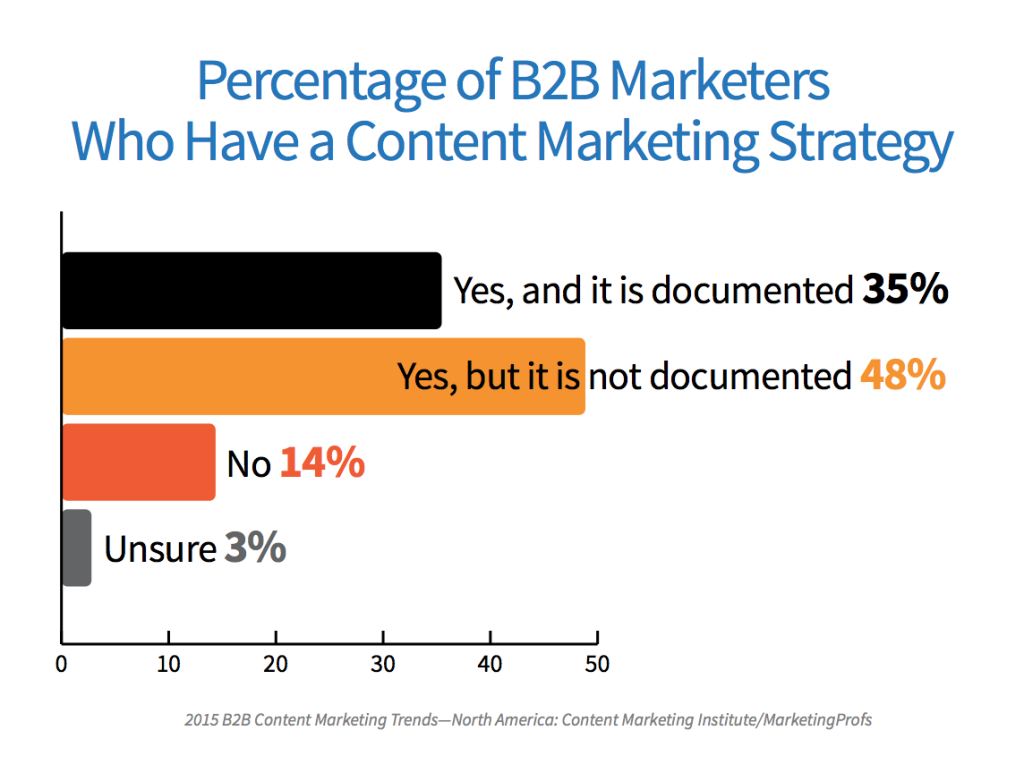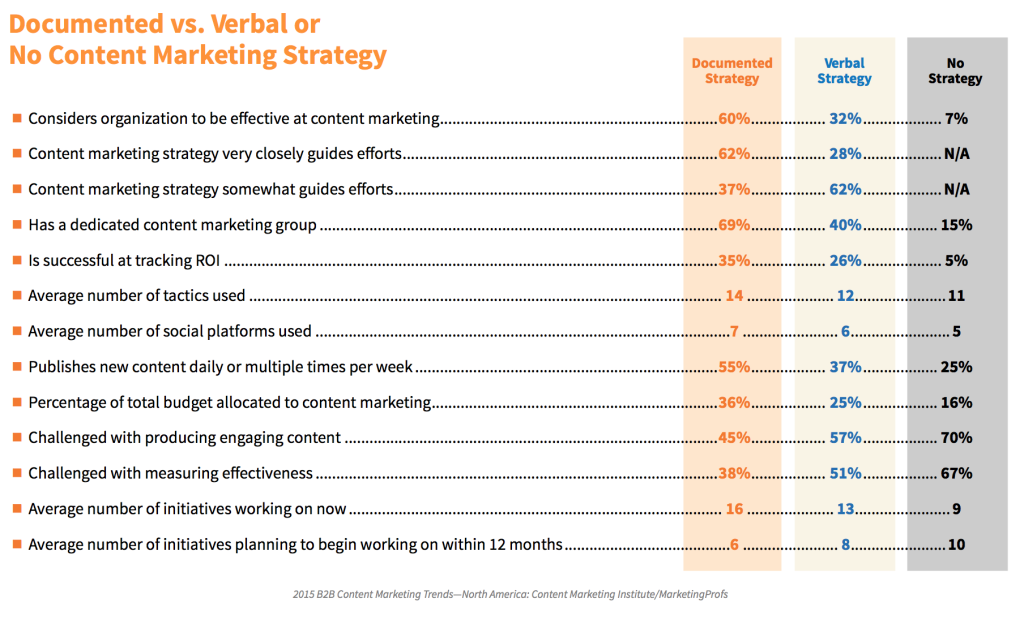The Undeniable Reason You Need To Document Your Content Marketing Strategy – Today

It’s that time of year – the time when the masterminds at Content Marketing Institute and MarketingProfs school B2B marketers in all things content marketing.
The organizations recently released B2B Content Marketing: 2015 Benchmarks, Budgets, and Trends – North America. Sponsored by brightcove, the report covers everything from usage and effectiveness to budgets and spending.
As usual, it’s full of interesting tidbits (70% of B2B marketers are creating more content than they did one year ago! 94% of B2B marketers use LinkedIn to distribute content!), but what I found most interesting is what the report highlights as the key theme unearthed by this year’s data:
If you want to be more effective at content marketing, document your strategy.
Now that the term “content marketing” is on every marketer’s radar, marketers everywhere are either:
1) fully on board
2) eager to jump on board, or
3) eager to say they’ve been on board all along.
And what I’ve noticed from many of the #2s and #3s out there is this: While everyone wants to content market, no one wants to content market strategize. Many marketers are so eager to start developing, sharing and engaging with content, that they are tempted to skip the critical component of developing and detailing their content marketing strategy.
The report found the same. Last year, 44% of B2B marketers surveyed said they had a documented content marketing strategy. This year, 35% say they have a documented content marketing strategy and 48% say they have a content marketing strategy, but it is not documented.

As the report states: “Having a verbal strategy is a great first step. However, as the research shows, it pays to take the time to write it down: 60% of those who have a documented strategy rate themselves highly in terms of content marketing effectiveness, compared with 32% of those who have a verbal strategy.”
That’s a pretty significant gap between the two groups. And it makes sense. The act of writing a concept or a strategy down makes it real and tangible. It keeps everyone working toward the same goals. And it ensures that everyone’s understanding of the strategy is in sync.
Because even if you’ve discussed your content marketing strategy repeatedly, your recollection and your takeaway can be vastly different than that of your coworkers. And if you start off on an unsure path, what will keep you on track after content marketing for months, or years? Without a written strategy, you have nothing to check yourself against to ensure you’re still moving in the right direction.
Here’s another look at the differences between content marketers who have a documented strategy and those with only a verbal strategy or no strategy at all:

Strategy is important. We all know that. But knowing it’s important and actually making moves to develop a strategy are two different things. I get it.
So if, in your heart of hearts, you know that you STILL won’t be developing a content marketing strategy to support your efforts (whether because of budget or time or a boss who still doesn’t believe in this “Internet” thing), at least take a moment and write down the following. I promise, it will be worth it.
- Your goals. What do you want your content marketing strategy to achieve? (Make these measureable!)
- Your content vision statement. What is the overarching vision of the content you will develop?
- Your key words. What are the right words and phrases you should use to connect with your audiences?
- Your calls to action. What action do you want your audiences to take after reading your amazing content?
- Your baseline metrics. Where are you today in terms of reaching your goals? (You need these to see how you improve!)
It’s not everything, but it’s a start. And once you start, hopefully you’ll be compelled to move from the scary gray column in the right of the graphic above into the warm and fuzzy peach column on the left.
Want to talk strategy? Contact us for help putting that vision down on paper.
MORE ARTICLES
-
 Why “Strong Academics & Caring Community” Aren’t a School Story
Why “Strong Academics & Caring Community” Aren’t a School Story -
 Busy, Scattered, Exhausting: What’s Really Wrong With Your School Marketing
Busy, Scattered, Exhausting: What’s Really Wrong With Your School Marketing -
 Why Most Schools Don’t Actually Have a Clear Story
Why Most Schools Don’t Actually Have a Clear Story -
 Clarity in 50 Words or Less: How to Write Your School’s One-Sentence Story
Clarity in 50 Words or Less: How to Write Your School’s One-Sentence Story -
 What Should Your School Do with Its Blog Now That AI Is Changing Search?
What Should Your School Do with Its Blog Now That AI Is Changing Search? -
 What Is Your Private School’s Bold & Unifying Big Promise?
What Is Your Private School’s Bold & Unifying Big Promise? -
 AI Writing Prompts to Power Private School Storytelling
AI Writing Prompts to Power Private School Storytelling -
 When to Outsource Your Private School Content Marketing to an Expert
When to Outsource Your Private School Content Marketing to an Expert